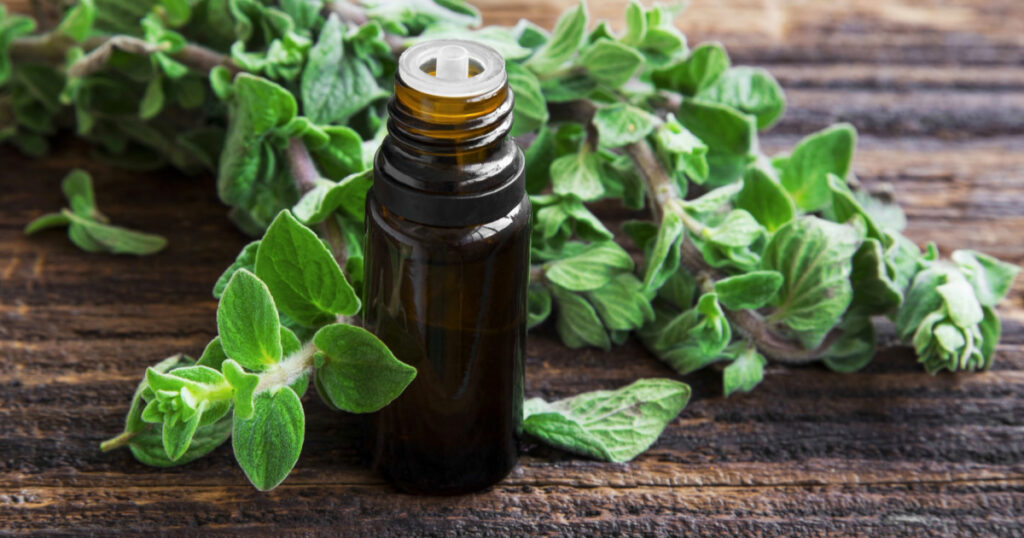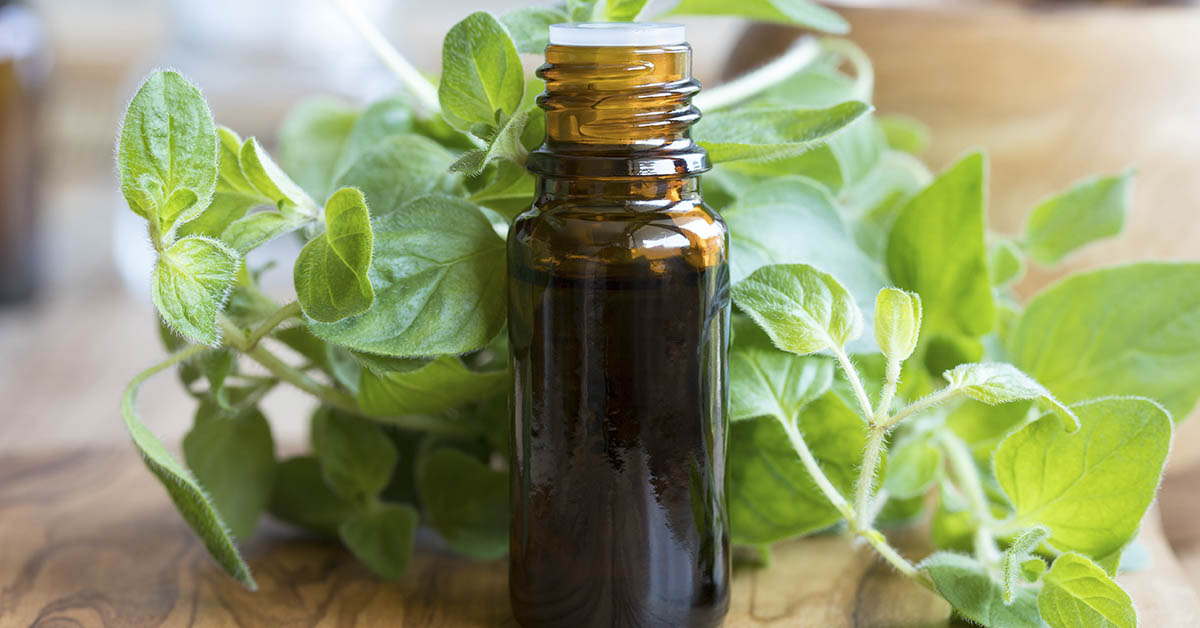Oregano is not just a fragrant herb that adds flavor to our favorite dishes; it also has incredible health benefits. Oregano oil is a concentrated form of this versatile herb and has been used for centuries for its medicinal properties. Let’s explore some of the potential benefits and uses of oregano oil, particularly in treating pain, sores, and infections.
Benefits and Uses of Oregano Oil
As already mentioned, oregano is more than just your favorite pizza herb! It is an antiseptic, antibacterial, and anti-inflammatory agent that is particularly powerful in its oil form. These are some of the ways that oregano oil benefits your health.
1. Antibacterial and Antiviral Properties

Oregano oil contains powerful compounds such as carvacrol and thymol, which are known for their antibacterial and antiviral properties. (1) These properties make oregano oil a purported natural remedy for fighting various infections caused by bacteria and viruses. Anecdotally people report that oregano oil has helped them when dealing with cold symptoms; however, human evidence is lacking.
2. Immune System Support

Oregano oil may help support the immune system. The antioxidants, particularly thymol and carvacrol, present in oregano oil help combat free radicals and protect the body from oxidative stress.
Read: Are Essential Oils the Secret Weapon to Survive Allergy Season?
3. Pain Relief

Oregano oil possesses natural analgesic properties that can help alleviate pain caused by various conditions. Applying diluted oregano oil topically can help reduce muscle pain, joint inflammation, and headaches. Simply mix a few drops of oregano oil with a carrier oil like coconut or olive oil and massage the affected area for relief. (2)
4. Wound Healing and Soothing Sores

Oregano oil may help promote wound healing and soothe sores. Its antiseptic and antimicrobial properties may help prevent infections in wounds and promote faster healing. Dilute a few drops of oregano oil with carrier oil and apply it to the affected area to speed up the healing process. (3)
5. Digestive Health

Oregano oil can be beneficial for digestive health. It possesses carminative properties that aid in relieving digestive issues such as bloating, indigestion, and stomach cramps. Oregano oil helps stimulate the production of digestive enzymes, thus promoting better digestion. (4)
6. May Aid Respiratory Health

Oregano has been used traditionally to provide relief from respiratory conditions such as coughs, bronchitis, and colds (5).
Two randomized control trials discovered that carvacrol (an active compound in oregano) supplements improved inflammation, lung function, and respiratory symptoms in patients with lung damage and asthma. (6, 7)
Its antimicrobial properties help combat the pathogens responsible for respiratory infections. You can inhale oregano oil by adding a few drops to a bowl of steaming water or use a diffuser to enjoy its respiratory benefits. Overall, further evidence is needed to see if oregano or oregano oil would be effective in this way.
Read: Can Essential Oils Help With Asthma?
7. Help to Lower Cholesterol

Oregano oil contains numerous polyphenols, including carvacrol and thymol. Some research shows that these specific two polyphenols may help to lower cholesterol. Some studies show these as effective at lowering cholesterol in both mice and humans. It is important to note, however, that these studies are limited, and more research is necessary. (8)
How to Use Oregano Oil to Treat Pain, Sores & Infections
There is some evidence to suggest that oregano oil is an effective, natural solution to treating pain, sores, and infections. This is largely due to its antibacterial, antiseptic, and anti-inflammatory properties. The following is how to use the oil properly to treat these conditions, as doing so improperly could cause you some harm.

- Topical Application: Dilute a few drops of oregano oil with a carrier oil and apply it directly to the affected area for pain relief or to soothe sores.
- Steam Inhalation: Add a few drops of oregano oil to a bowl of hot water, cover your head with a towel, and inhale the steam for respiratory relief.
- Diffuser: Use an essential oil diffuser to enjoy the therapeutic benefits of oregano oil. Be sure to follow the manufacturer’s instructions for safe and effective use.
- Internal Consumption: Consult a healthcare professional or a qualified aromatherapist before consuming oregano oil internally for medicinal purposes. They can guide you on the appropriate dosage and potential interactions with medications.
Remember, oregano oil is highly concentrated, so always dilute it before applying topically or consuming internally. Additionally, it’s important to do a patch test on a small area of skin before using oregano oil to ensure you’re not allergic or sensitive to it.
The Bottom Line
Oregano oil is a versatile and potent natural remedy that may offer numerous health benefits. However, the evidence is limited. From its antibacterial and antiviral properties to its pain-relieving and wound-healing abilities, oregano oil may be a valuable addition to your natural medicine cabinet. However, it’s always best to consult a healthcare professional before using oregano oil for any specific medical conditions.
Keep Reading: The Health Benefits of Black Seed Oil
Disclaimer: This information is not intended to be a substitute for professional medical advice, diagnosis or treatment and is for information only. Always seek the advice of your physician or another qualified health provider with any questions about your medical condition and/or current medication. Do not disregard professional medical advice or delay seeking advice or treatment because of something you have read here.
Sources
- “Oregano.” Examine
- “Antinociceptive, anti-inflammatory, and cytotoxic properties of Origanum vulgare essential oil, rich with β-caryophyllene and β-caryophyllene oxide.” NCBI. Armenuhi Moghrovyan, et al. April 2022.
- “What are the benefits of oregano oil?” Medical News Today. Jon Johnson. January 16, 2019.
- “Herbal Therapy is Equivalent to Rifaximin for the Treatment of Small Intestinal Bacterial Overgrowth.” Sage Journal. Victor Chedid, Md., et al. May 1, 2014.
- https://openaccesspub.org/ijn/article/1055
- “Possible therapeutic effect of carvacrol on asthmatic patients: A randomized, double blind, placebo-controlled, Phase II clinical trial.” Wiley Online Library. Azam Alavinezhad, et al. November 2017.
- https://www.sciencedirect.com/science/article/abs/pii/S1043466618303296?via%3Dihub
- “The effects of essential oils and aqueous tea infusions of oregano (Origanum vulgare L. spp. hirtum), thyme (Thymus vulgaris L.) and wild thyme (Thymus serpyllum L.) on the copper-induced oxidation of human low-density lipoproteins.” Pubmed. Tea Kulisić, et al. March 2007.

